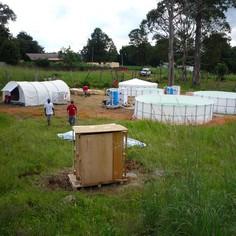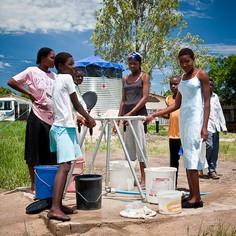
Humanitarian and Development
Place
Zimbabwe
Date
2009
Partners
Croix-Rouge française
Unicef
European Commission Humanitarian Office (ECHO)
Emergency response
The International Federation of Red Cross and Red Crescent Movement enlisted the aid of several of its national bodies, including the French Red Cross, which in turn requested help from the Veolia Environnement Foundation. The Veoliaforce volunteers supervised an emergency response team with special expertise in water supply and treatment. Ten metric tons of emergency equipment and two "Aquaforce" mobile water treatment units, financed by the Veolia Environnement Foundation, were sent to the capital, Harare.
After evaluating the needs and identifying the most appropriate areas to deploy the equipment, the team installed a first emergency unit in Harare itself, where it supplied drinking water to 10,000 people in the Chikurubie district. A second team took over and installed the second mobile unit in the city of Chitungwiza to supply water to strategic points in the town, such as the health center. The Veoliaforce experts also provided training to the Zimbabwe Red Cross. They are responsible for operating the water treatment units and sending teams to rural areas in order to raise awareness on best hygiene practices.
Having a long term impact

Ensuring a long-term impact, after these emergency actions, requires improving access to water and wastewater treatment in the country's main cities, to stop the diseases' spread.
In 2009, Veoliaforce volunteers conducted a detailed technical study of drinking water plants in seven cities located next to the capital and in the eastern part of the country. These preliminary studies are prerequisites for rehabilitating the installations. With the Unicef, volunteers evaluated the water treatment plants of Kwekwe (population 200,000), Mutare (population 300,000), Marendara (population 90,000) and Bindura (population 100,000), and proposed an action plan to improve access to water.
In 2010, with the French Red Cross, three water treatment plants were scheduled to undergo renovations: Chitungwiza (population 620,000), Chegutu (population 47,000) and Kadoma (population 79,000). For each plant, the volunteers follow the same steps: first an evaluation of the plant and its equipment is conducted to produce a priority list of actions for the renovation, which in term helps identify the equipment needing replacement; once the equipment is set up, volunteers work with the French Red Cross to check and adjust the system; then the treatment plant starts up at the same time as the local personnel is trained. Finally, the volunteers validate that the plant is fully functioning.
The Chitungwiza plant, renovated in spring of 2010, proved the efficiency of these missions and of the joint effort between the French Red Cross and the Veolia Foundation. The successful launch of the plant convinced the European Commission Humanitarian Office (ECHO) to finance up to two million euros the renovation of several treatment plants in Zimbabwe, in order to help in the fight against cholera. Today, the Chitungwiza, Chegutu and Kadoma plants are renovated and bring drinkable water to close to 750,000 people.
Early 2011, the Foundation started, with the French Red Cross, the last renovation activity on the water treatment plant in Gwanda, town in the southern part of the country which counts a population of 15,000. The evaluation work led by Veoliaforce allowed the French Red Cross to prioritise the actions necessary for the plant. Two additional missions will take place in order to fully renovate the infrastructure.
Combating cholera, from emergency to rehabilitation of infrastructure
- Cholera epidemic in 2008/2009 : close to 100,000 cases and 4,300 deaths
- Emergency and development responsed involved 12 volunteers for a total of 234 days of mission since 2008
December 2008 - March 2009
- 2 mobile water treatment units (Aquaforce 5 000) in Harare and Chitungwiza
- 3 Veoliaforce volunteers in the field
- 63 days of mission
Starting May 2009
With the Unicef bureau in Zimbabwe :
- Technical evaluation missions for water production sites in 4 towns : Bindura, Kwekwe, Marendara, Mutare
- Close to 1 million people helped
- 3 Veoliaforce volunteers in the field
- 75 days of mission
With the French Red Cross :
- Technical evaluation missions and rehabilitation of 4 water plants in the towns of Chegudu, Chitungwiza, Kadoma et Gwanda
- Close to 50 operators formed
- 6 Veoliaforce volunteers in the field
- 96 days of mission

